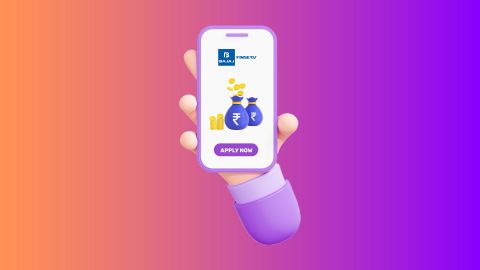Loans play a crucial role in today's financial landscape, allowing individuals to fulfil their dreams, overcome financial hurdles, and manage various unexpected expenses. A personal loan is one such popular type of loan, which provides funding with flexible tenure options.
Read on to understand the concept of loans and explore how they help you in achieving your financial goals.
What is loan?
A loan is a financial arrangement between a lender and a borrower. The lender provides a specific amount of money to the borrower, which the latter agrees to repay along with an interest charged over the predetermined tenure. Loans are designed to provide you with the access to funds they you may not have readily available, allowing them to manage big or small expenses.
What is a lender?
A lender is an entity, typically a financial institution, that provides funds or resources to borrowers with the expectation of repayment. Lenders can offer various types of loans, including mortgages, personal loans, or business loans. Interest rates and terms vary, influencing the cost and conditions of the borrowed funds.
What is a personal loan?
A personal loan is a flexible borrowing solution that can be used for various purposes, including home improvements, education expenses, medical bills, weddings, and more. Unlike loans for specific purposes, such as home loans or auto loans, personal loans offer greater flexibility in terms of usage. Further, a personal loan is an unsecured loan which doesn’t require any security or collateral for borrowing funds. Instead, lenders evaluate your creditworthiness based on the CIBIL Score, credit history, income, employment status, and other factors.
What are the components of a loan?
Understanding loan information is essential before borrowing. Here's how loans typically function:
Application: To apply for a personal loan, you must complete an application process. The application typically requires personal and financial information, including KYC, income details, employment history, and current debts.
Loan approval: Once you submit the loan application, the lender evaluates your creditworthiness by reviewing your credit score, and other financial details. If you meet the eligibility criteria, you will receive approval on your loan application. The loan amount, interest rate, repayment term, and any additional fees or charges will be specified in the loan agreement.
Funds disbursement: Once you accept the loan offer, the funds are disbursed to your bank account. And you can then utilise the funds as per your needs.
Repayment: Personal loans are repaid in fixed monthly instalments over a specific period, typically ranging from 12 months to 96 months. The borrower is responsible for making timely repayments, which include the principal amount borrowed and the accrued interest.
Learning about loans helps borrowers make informed financial decisions, ensuring timely repayments and maintaining a healthy credit profile.
What are the factors affecting loan approval?
Approval for loans depends on several key factors that lenders assess:
- Credit score: A strong credit score highlights your creditworthiness and reliable repayment history.
- Stable income: Consistent and sufficient income assures lenders of your repayment capacity.
- Debt-to-income Ratio: A low ratio signals better financial health and reduces lending risks.
- Clean credit history: No defaults or late payments improve your chances of approval.
By maintaining a solid financial profile, you can increase your eligibility and secure personal loans more easily.
Tips on getting a loan
Getting a loan can be easier if you follow some simple yet effective steps. Here's how:
- Understand your needs: Assess why you need the loan and calculate the required amount. For instance, a loan example could be borrowing Rs. 5 lakh for a home renovation.
- Check your credit score: A strong credit score improves your eligibility and helps you secure better interest rates.
- Compare lenders: Research multiple lenders to find one offering favorable terms, such as low-interest rates, minimal fees, and flexible repayment options.
- Maintain a low Debt-to-income eatio: A lower ratio shows lenders that you can manage additional repayments without strain.
Prepare required documents: Ensure all documents, including KYC, income proof, and employment details, are accurate and ready for submission.
Choose the right loan type: Pick a loan tailored to your needs, such as a personal loan for emergencies or a home loan for property purchases.
Read the fine print: Understand all terms, including interest rates, hidden fees, and prepayment charges, before signing the agreement.
By following these tips, you can enhance your chances of loan approval and secure terms that align with your financial goals.
Types of Loans
1. Secured vs. unsecured loan
A secured loan requires collateral, such as property, gold, or a vehicle, which acts as security for the lender. Examples include home loans and car loans. These loans typically offer lower interest rates since they are less risky for lenders.
In contrast, an unsecured loan doesn’t require any collateral. Personal loans and credit cards are common examples. While they are easier to obtain, they often come with higher interest rates due to the increased risk for lenders.
Choosing between these depends on your financial needs and the assets you can pledge.
2. Revolving vs. term loan
A revolving loan provides a flexible credit limit, allowing borrowers to use, repay, and reuse funds repeatedly within a set limit. Credit cards and lines of credit are examples.
On the other hand, a term loan is a lump-sum amount borrowed for a fixed duration with scheduled repayments, such as personal or business loans. These loans are ideal for one-time funding needs.
Understanding these distinctions helps in selecting the right loan type for your financial goals.
What are the benefits of a personal loan?
1. No collateral required
A personal loan does not require collateral, in contrast to secured loans like gold loan or home loan. This means you are not required to put up any assets or other forms of security for borrowing the loan amount.
2. Flexibility
Personal loans come with a fair amount of flexibility on how they can be utilised. From planning a lavish destination wedding, covering expenses of higher education, to giving your home a makeover – a personal loan can be used for any of these purposes and then some.
3. Quick access
Personal loans are processed more swiftly than other types of loans. It is hence a popular choice for those in need of funds urgently. We offer personal loans that can be disbursed typically within 24 hours* after approval. This makes it the finest option for taking care of your unforeseen expenses without breaking a sweat.
4. Fixed repayment schedule
Personal loans typically come with fixed repayment terms and predictable costs, allowing you to plan your monthly budget effectively. To make informed decisions, it's essential to understand the rate of interest of personal loan, as it directly impacts your overall repayment amount. Fixed interest rates ensure stability, helping you manage your finances with ease throughout the loan tenure
5. Flexible tenures
There are flexible payback terms available for personal loans. This enables you to select a payback period based on your income and financial position that is suitable. Our personal loans are a well-liked choice because of the flexible repayment tenures of up to 96 months. Bajaj Finance Personal Loans can be the best choice for people who seek more freedom in their repayment terms.
Loans are an easy financial option that helps individuals to meet their personal and financial goals. By understanding the concept of loans and how they work, you can make informed decisions when seeking financial assistance. Whether it's covering unexpected expenses, managing financial emergencies, or pursuing personal aspirations, personal loans offer a flexible and accessible solution. However, it's important to carefully evaluate the terms and conditions, interest rates, and fees associated with personal loans before taking a loan.
With Bajaj Finance Limited, you can get a personal loan of up to Rs. 55 lakh, which you can repay over a tenure of 96 months. You can also use our personal loan EMI calculator to compute your monthly EMIs in advance and plan your loan repayment journey wisely.




